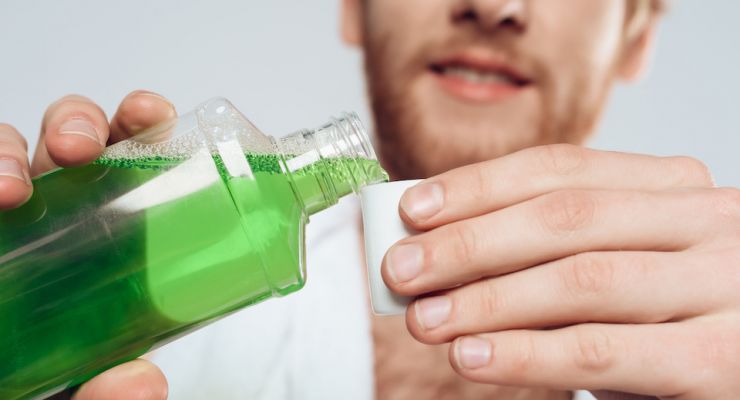You, like 200 million other Americans, may take a swig of mouthwash in the morning or evening to rinse out any disease-causing bacteria and keep your mouth feeling fresh and clean. Unfortunately, this practice is not be doing you any favors and could be harming your health. Not your dental health, but something even more concerning…your heart health. Here is the shocking link between antiseptic mouthwash and your cardiovascular system that will have you swearing off this “healthy” habit for good.
What’s the problem?
This study, published in the Free Radical Biology and Medicine journal discovered an alarming connection between increased blood pressure, heart attack, stroke risk stemming from the daily use of many popular antiseptic mouth rinses.
The chemical that caught their attention is known as chlorhexidine. It is a powerful antiseptic and disinfectant that is added to some commercial oral health products. The study observed 19 healthy individuals over a one week observation period where they rinsed with Corsodyl, an antiseptic mouthwash, twice each day.
Professor Amrita Ahluwalia, the lead author of the study, observed that “Cordosyl use retracts the oral bacterial conversion from nitrate to nitrate which reduces the plasma nitrate levels that are associated with increases in blood pressure. The mouthwash led the participants’ blood pressure to rise between 2 to 3.5 mmHg, with a noticeable effect found within one day of using the mouthwash twice.”
This increase in blood pressure is significant and could increase your risk of developing cardiovascular disease by 7 percent. Plus, this type of antiseptic agent cannot distinguish between the “good” germs that your body needs for a strong immune system and the “bad” bugs that contribute to disease. When these friendly germs are killed off, your body is not able to produce enough nitrate, which is needed for the healthy dilation of blood vessels. In fact, this mouthwash caused nitrite production in the mouth to fall by over 90 percent, and blood nitrite to fall by 25 percent. This increases your likelihood of heart failure or heart disease by leaps and bounds.
Thankfully, in the United States, chlorhexidine is not added to most over the counter mouthwashes, as generall mouthwashes are usually antibacterial, not antiseptic. However, dentists do prescribe products containing this component for patients recovering from oral surgery and those with periodontal disease. If your dentist has prescribed mouthwash with chlorhexidine due to a gum or tooth infection, the primary concern in this instance is eradicating the harmful infection and restoring your mouth to a healthy state. Consult with your dentist about the risks of this type of mouthwash; however, it may be necessary for a time. Other than an instance of infection, there is no reason to expose yourself to the risks of an antiseptic mouthwash.
Though other mouthwashes may not contain such harsh ingredients, they could still prove harmful because they can disrupt the natural production of beneficial oral bacteria.
What to do
It’s unnecessary
The bottom line, mouthwash is an unnecessary added step in your daily oral hygiene routine that could potentially be harmful to your health. Even if your mouthwash doesn’t have chlorhexidine, it could contain several other harmful ingredients that you should keep away from your body. Following a strict schedule of brushing for at least two minutes, 2x per day and flossing at least once with twice-yearly visits to the dentist will ensure that your mouth stays clean and healthy.
Change from the inside out
If you’ve been using an antiseptic mouthwash to combat halitosis, you’ve been approaching the problem from the wrong angle. Start from the inside and change your diet to include healthy amounts of fresh fruits and veggies. Cut down on processed dairy and limit your meat intake. Set reminders on your phone to help you drink at least eight glasses of water each day and ditch sugary treats and snacks.
Natural mouthwash
If you’re used to the fresh feeling of mouthwash and want a little something extra to leave you with that minty aftertaste, consider a natural herbal mouthwash with a tea tree base. Or you can make your own with sea salt dissolved in warm water and a few drops of a food-grade essential oil such as peppermint or wintergreen.
-Susan Patterson

